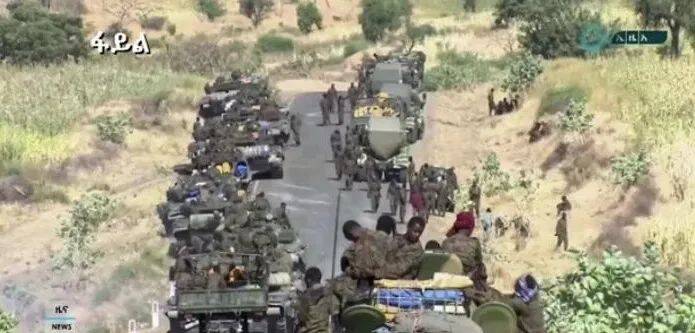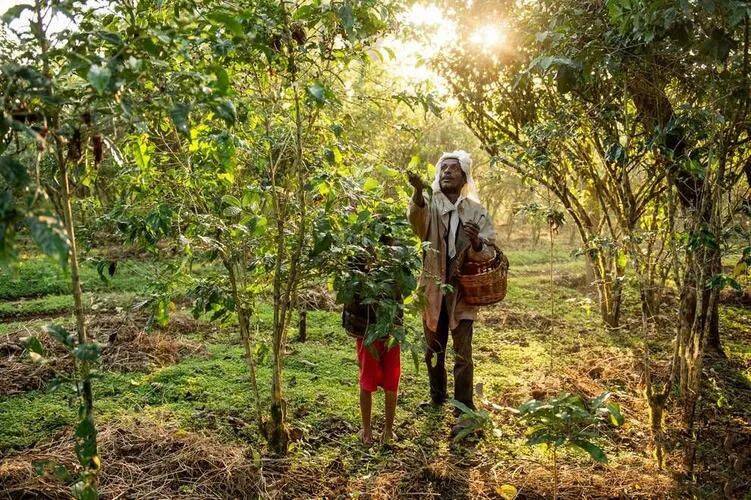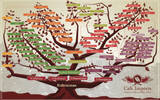The Ethiopian government added 40,000 new recruits! Large-scale exchanges of fire broke out in many places
According to Ethiopian media reports, the Ethiopian government recently increased its troops by 40,000 and began a new round of action against the Farno militants (Fano), resulting in very serious conflicts in many areas of Amhara State, which had a serious impact on the economy and security in many parts of the country.

It is reported that there was a fierce exchange of fire between government security forces and Fano militants in the Sigojam area of Amhara, and heavy weapons were used in some important towns. According to local residents, there was a serious exchange of fire around several towns in the morning and did not decrease until the afternoon.
Due to the fierce exchange of fire between the two sides, the movement of people and vehicles in most cities in the area has stopped, residents are afraid to leave their homes, and Fano militants operating in the area have announced an indefinite ban on vehicles. The aim is to disrupt the logistical supply of government forces, which is known and observed by people in the transport industry and truck drivers.
According to the Ethiopian government, it has launched a "final military operation" against the Fano armed forces in the Amhara region, adding up to 40,000 troops for this round of military operations, declaring an all-out war in the Amhara area, and at the same time, arresting senior government officials in the Amhara region for doing nothing in military operations against the Fano armed forces and "supporting the Fano armed forces" So far, more than 600 senior government officials have been arrested, while doctors have been arrested on suspicion of cooperating with Farno forces.
In the exchange of fire in recent days, government forces have carried out large-scale military operations in the area and repeatedly deployed drones to launch attacks in the area, but according to a spokesman for Farno Armed Forces, government forces seem to have been defeated one after another. It is said that in the recent clashes in Amhara, about 293 government soldiers were killed and that a considerable number of guns were seized, but four people were killed and five injured in the Fano armed forces.
It is understood that the war in the Amhara region has been going on for more than a year. More than a year ago, the Ethiopian federal government launched a military operation in the Amhara region on the ground of "disarming the Fano forces," resulting in frequent conflicts in many parts of the state and serious injuries. Although the Ethiopian federal government has repeatedly deployed tens of thousands of troops in the hope of defeating the Farno armed forces in the state, it has been effective because the Farno armed forces have received overwhelming popular support in the region.
While Amhara is the main agricultural and animal husbandry location in Ethiopia, it is mainly food supply in the country, while the current serious internal conflicts and the closure of roads by Farno forces in some areas will affect the transport of goods between regions and may exacerbate the rise in prices in the country.
However, the war had a negative impact on social and economic activities in the region, although the war took place mainly in areas such as Amhara State, mainly in northern Ethiopia, but from time to time some conflicts spread to the central or western Oromia region. Some experts believe that although the largest internal period ends in November 2022, ongoing conflicts and violence have led to a significant reduction in foreign direct investment inflows.
At present, the biggest problem for the Ethiopian coffee industry is the sharp fall in the exchange rate and the rise in local prices and costs. Earlier, the new reform certificate issued by the Ethiopian federal government led to the sharp devaluation of the Ethiopian currency Bill, the crazy rise in domestic prices in Ethiopia, and the rising cost of growing coffee, but the intensification of the current war may cause local prices to rise again, all because continuing security problems in Ethiopia have disrupted international freight and logistics, exacerbating the continued rise in costs.
Although Ethiopia's coffee exports have soared in recent months, it is mainly because European coffee traders believe that it is difficult for coffee from Ethiopia and other African countries to meet the EU's EUDR requirements for non-deforestation, so they increase their procurement before the regulation takes effect on December 30, 2024.
Although the European Union recently said that it would be delayed by one year, that is, until December 30, 2025, some traders are still worried that since Ethiopia is mainly small farmers, it is very difficult to verify that its coffee meets the requirements of the EU EUDR, and it is reported that if EU standards are met, the cost of production will be increased by 10%.

And it was difficult for most Ethiopian producers to meet the requirements this year, and the Ethiopian government did nothing about it. In addition, the current cost of growing coffee in Ethiopia is very high, so many producers or farmers may not be willing to increase their investment by 10% to meet EU requirements.
For more information about coffee producing areas, please scan the code directly and follow: coffee comments.
Long press the QR code to follow:
Important Notice :
前街咖啡 FrontStreet Coffee has moved to new addredd:
FrontStreet Coffee Address: 315,Donghua East Road,GuangZhou
Tel:020 38364473
- Prev

How many common colors are there in the bourbon variety?
Among the Arabica varieties, Typica and Bourbon varieties are the most genetically important coffee varieties in the world and the oldest existing coffee variety, but people will pay more attention to the Bourbon variety because of the current Bourbon variety. There are many color variants. Speaking of bourbon, according to one
- Next

I had no choice! Ruixing employees ask customers for good reviews?!
▲ Click to pay attention| Daily Boutique Coffee Culture Magazine Coffee Workshop Recently, many Lucky users have reported that when they go to the store to pick up meals, employees who have always been silent will ask customers to move their fingers and give them a good review. This is not uncommon in the catering service industry. After all, customer evaluations are often linked to employee salaries, because
Related
- What grade does Jamaica Blue Mountain No. 1 coffee belong to and how to drink it better? What is the highest grade of Blue Mountain coffee for coffee aristocrats?
- What are the flavor characteristics of the world-famous coffee Blue Mountain No. 1 Golden Mantelin? What are the characteristics of deep-roasted bitter coffee?
- Can I make coffee a second time in an Italian hand-brewed mocha pot? Why can't coffee be brewed several times like tea leaves?
- Hand-brewed coffee flows with a knife and a tornado. How to brew it? What is the proportion of grinding water and water temperature divided into?
- What is the difference between Indonesian Sumatra Mantinin coffee and gold Mantinin? How to distinguish between real and fake golden Mantelin coffee?
- What does bypass mean in coffee? Why can hand-brewed coffee and water make it better?
- Unexpected! Ruixing Telunsu lattes use a smoothie machine to foam milk?!
- % Arabia's first store in Henan opens into the village?! Netizen: Thought it was P's
- Does an authentic standard mocha coffee recipe use chocolate sauce or powder? Mocha Latte/Dirty Coffee/Salty Mocha Coffee Recipe Share!
- What is the difference between Vietnam egg coffee and Norway egg coffee? Hand-brewed single product coffee filter paper filter cloth filter flat solution!

